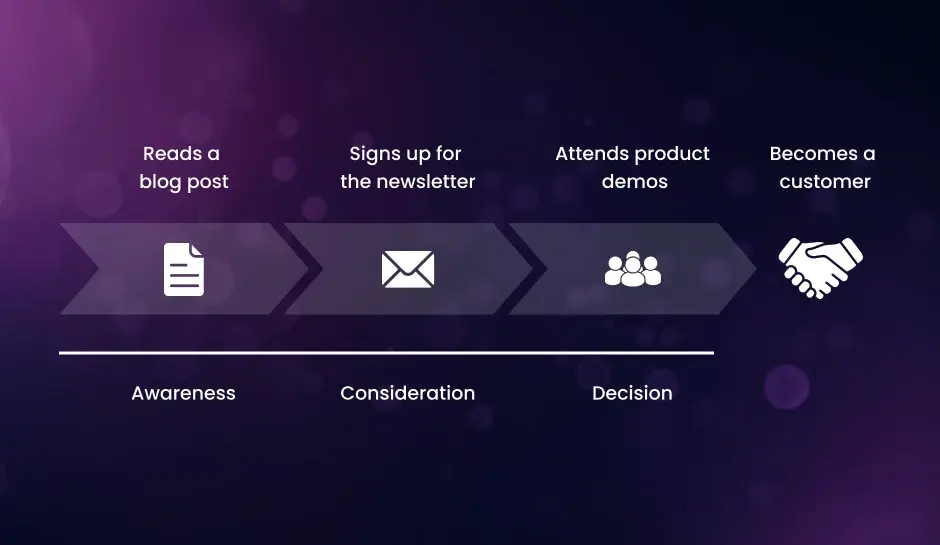
All You Need to Know About Lead Scoring and Its Importance in Marketing Automation
Are you seeking a foolproof method to maximize your sales and marketing efforts? Look no further than lead scoring. It's time to supercharge your lead generation strategy by incorporating the revolutionary lead scoring technique. Let us guide you through the ins and outs of this game-changing process and show you how it can transform your business.
Lead scoring is a systematic approach that assigns a numerical value to your potential leads based on their behavior, demographics, and interactions with your brand. It streamlines your sales and marketing processes by helping you prioritize and focus your efforts on the most promising leads.
The Importance of Lead Scoring in Sales and Marketing Automation
In today’s increasingly competitive market, companies can now afford to save time and resources on effective strategies. With lead scoring, you can automate the lead qualification process, ensuring your sales team spends their valuable time on qualified leads most likely to convert.
Benefits of Implementing a Lead Scoring System
A lead scoring system brings advantages. Save time and resources by focusing on leads with the highest potential for conversion. Enhance customer relationships by tailoring your messaging and approach based on the lead’s level of engagement. Increase revenue by prioritizing leads who are ready to move further down the sales funnel.
How to Lead Scoring Improves Sales and Marketing Alignment
Lead scoring aligns your sales and marketing teams by providing them with a unified understanding of lead quality and readiness. By establishing clear criteria, both teams can be on the same page when pursuing leads, fostering collaboration, and driving overall organizational success.
The Role of Data Analysis and Analytics in Lead Scoring
Data analysis and analytics lie at the core of effective lead scoring. By leveraging insights gained from data analysis, you can make more accurate predictions and identify patterns that enable you to refine your lead-scoring model continually.
Understanding Inbound Marketing and Lead Generation
Understanding and implementing effective marketing strategies are essential for success and one such strategy is inbound marketing, which focuses on attracting, engaging, and delighting potential customers.
Inbound marketing involves various strategies and tactics aimed at attracting and engaging prospects, ultimately nurturing them into loyal customers. These strategies include creating valuable content, implementing SEO techniques, leveraging social media platforms, and utilizing email marketing campaigns.
Importance of lead generation in inbound marketing
Lead generation is fundamental in inbound marketing as it involves capturing the interest and contact information of potential customers. This allows businesses to build relationships with these leads, providing relevant information and nurturing them throughout their buying journey.
How lead scoring complements lead generation efforts
Lead scoring, a critical component of lead generation involves assigning values or scores to leads based on their behavior, demographics, and actions. This process helps businesses prioritize and qualify leads, ensuring that sales teams focus their efforts on the most promising prospects.
Role of lead nurturing and engagement in the inbound marketing process
Lead nurturing and engagement go hand in hand with lead generation. Effective nurturing involves providing relevant, personalized content to leads at each stage of their journey, building trust and credibility. Engaging with leads through targeted communication further strengthens these relationships and increases the likelihood of conversion.
Fundamentals of Lead Scoring
Lead scoring is a systematic approach used by marketing and sales teams to determine the value of potential leads based on specific criteria. It helps prioritize leads and understand their interest and readiness to purchase.
The components of lead scoring typically include demographic information, firmographics, engagement level, and behavioral data. By analyzing these components, businesses can assign a numerical value or score to each lead, allowing them to focus their efforts on leads with higher scores.
Different scoring models and methodologies
Businesses can implement various scoring models and methodologies for lead scoring. One standard model is the points-based scoring system, where leads are assigned points based on their characteristics and activities.
Another model is the predictive scoring system, which uses advanced algorithms to predict the likelihood of a lead becoming a customer.
The choice of scoring model depends on the specific needs and objectives of the business. It is essential to consider the model and methodology carefully to ensure accurate and effective lead scoring.
Factors to consider when developing a lead scoring system
Developing a lead scoring system requires careful consideration of several factors. It is crucial to define the ideal customer profile and determine the key characteristics and behaviors that indicate a substantial likelihood of conversion. Additionally, businesses must identify the appropriate scoring criteria and weightage for each criterion.
Other factors include:
- Integration of sales and marketing efforts
- Alignment with the buyer’s journey
- Regular evaluation and refinement of the scoring system
By addressing these factors, businesses can develop a robust lead-scoring system that maximizes conversions.
Best practices for assigning scores to leads
Assigning scores to leads requires a well-defined set of best practices to ensure accuracy and fairness. One best practice is to involve stakeholders from both marketing and sales teams in developing the scoring criteria and weightage.
It is also essential to establish clear guidelines and definitions for each score range and communicate them effectively to all team members.
Regular monitoring and adjustment of scoring criteria based on feedback and performance data can further enhance the accuracy and effectiveness of lead scoring.
Key challenges and considerations in lead scoring implementation
Implementing lead scoring can come with its own set of challenges and considerations. One challenge is ensuring data accuracy and consistency, as lead scoring heavily relies on data quality. Businesses need to have reliable data collection processes and systems in place to avoid inaccuracies.
Another consideration is the need for continuous improvement and adaptation. Lead scoring should be a dynamic process that evolves with changing market conditions and customer behaviors.
Regular monitoring and adjusting scoring criteria will help keep the lead scoring system relevant and effective.
Using Data Analysis for Effective Lead Scoring
Understanding the role of data analysis and predictive modeling is crucial for effective lead scoring. By analyzing and modeling data, businesses can identify patterns and trends in their leads’ behavior and characteristics that can help determine their lead quality.
Predictive modeling techniques, such as regression analysis, can enhance lead-scoring accuracy by providing insights into lead conversion probabilities.
Importance of data quality and integrity for accurate lead scoring
Data quality and integrity play a significant role in accurate lead scoring. It is essential to ensure that the data collected is accurate, up-to-date, and reliable. Precise only or complete data can lead to misguided lead scores, wasting resources, and missed opportunities.
Regular data audits, data cleansing, and validation processes should be implemented to maintain the quality and integrity of data for optimal lead-scoring results.
How to leverage machine learning algorithms for lead scoring optimization
Machine learning algorithms offer a powerful solution for lead-scoring optimization. By leveraging algorithms like decision trees, random forests, or neural networks, businesses can automate the lead-scoring process and improve its accuracy over time.
These algorithms can analyze large volumes of data and detect patterns that traditional rule-based lead-scoring systems might miss. Regular tuning and training of these algorithms using historical data can enhance their performance.
Key performance indicators (KPIs) for measuring lead scoring effectiveness
Measuring lead scoring effectiveness requires the identification of key performance indicators (KPIs) that reflect the impact of lead scoring on business outcomes. KPIs like lead-to-customer conversion rate, average deal size, and sales velocity can help gauge the effectiveness of lead-scoring efforts.
By regularly tracking and analyzing these KPIs, businesses can evaluate the success of their lead-scoring strategies and make necessary adjustments to optimize performance.
Recommended tools and technologies for data analysis in lead scoring
Several tools and technologies are available to aid in data analysis for lead scoring. Data visualization tools like Tableau or Power BI can help businesses visualize and interpret lead-scoring data effectively.
Data mining tools like RapidMiner or KNIME can assist in extracting valuable insights from large datasets. Additionally, customer relationship management (CRM) systems with advanced analytics capabilities can provide a comprehensive solution for data analysis and lead-scoring integration.
Impact of Lead Scoring on Sales Performance
Implementing lead scoring can have a significant impact on sales performance, revolutionizing the way businesses approach their sales process. By effectively identifying and prioritizing leads, companies can optimize their sales efforts, increase conversion rates, and drive revenue growth.
Enhancing sales effectiveness through lead scoring
Lead scoring enables sales teams to focus on leads most likely to convert into customers. By assigning scores based on lead behavior, demographic data, and engagement levels, sales representatives can prioritize their outreach and tailor their sales pitch to meet the specific needs and interests of each prospect. This personalized approach results in higher conversion rates and improved sales effectiveness.
Streamlining the sales funnel and pipeline management using lead scoring
Lead scoring allows businesses to streamline their sales funnel and pipeline management by categorizing leads into different stages based on their scores. This categorization provides sales teams with clear insights into the progress of each lead, allowing them to take targeted actions at each stage of the sales process.
This streamlining ensures no hot leads fall through the cracks and helps sales representatives focus on leads most likely to move forward in the sales funnel.
Improving lead-to-customer conversion rates with targeted scoring
Lead scoring helps identify leads that have a higher likelihood of converting into paying customers. By analyzing lead behavior and demographics, businesses can optimize their scoring models to target leads with the highest conversion potential.
This targeted approach allows sales teams to allocate their resources more efficiently, resulting in improved lead-to-customer conversion rates.
Integrating Lead Scoring into CRM Systems
CRM systems play a crucial role in managing leads and customers. With the integration of lead scoring, businesses can enhance their sales and marketing alignment, leading to improved effectiveness in generating revenue.
Importance of CRM systems in managing leads and customers
CRM, or Customer Relationship Management, systems provide businesses with a centralized platform to store, track, and manage customer data. These systems enable organizations to efficiently handle leads, track interactions, and cultivate long-term relationships with prospects and customers.
How to integrate lead scoring with CRM systems for enhanced sales and marketing alignment
Integrating lead scoring with CRM systems is a game-changer for businesses. Companies can align sales and marketing efforts more effectively by incorporating lead-scoring models into their CRM systems. This integration allows teams to prioritize leads, nurture them based on their value, and deliver personalized communications that resonate with their needs and interests.
Benefits of leveraging CRM data for accurate lead scoring
Leveraging CRM data for lead scoring brings numerous benefits. By analyzing customer interactions and behaviors recorded in the CRM system, businesses can gain insights into lead quality and accurately identify potential buyers. Additionally, integrating CRM data in lead scoring enables companies to segment leads, targeting each segment with tailored messaging and strategies.
Challenges and considerations when implementing lead scoring within a CRM system
Implementing lead scoring within a CRM system has its challenges. Some considerations include ensuring the accuracy and relevance of the lead scoring model, defining clear criteria for lead qualification, and regularly evaluating and refining the scoring system as the business and market evolves. Additionally, businesses must train their sales and marketing teams to understand and effectively use lead-scoring information to maximize its potential.
Measuring and Reporting on Lead Scoring Performance
Tracking and measuring key metrics is essential to determine the effectiveness of your lead-scoring efforts. These metrics can provide valuable insights into the performance of your lead scoring system. Some key metrics to consider include:
- Lead Conversion Rate:
- Lead Velocity:
- Lead Quality:
- Marketing Qualified Leads (MQLs):
- Sales Qualified Leads (SQLs):
This metric measures the percentage of leads that convert into customers. A higher lead conversion rate indicates that your lead scoring system is effectively identifying and prioritizing high-quality leads.
Lead velocity measures the rate at which leads progress through the sales funnel. A higher lead velocity indicates that your lead scoring system is helping to accelerate the sales process.
This metric assesses the quality of leads generated through your lead-scoring efforts. By analyzing lead quality, you can determine if your lead scoring system accurately identifies leads likely to convert into customers.
MQLs are leads with a high likelihood of becoming customers based on their engagement with your marketing activities. Tracking the number of MQLs generated can help you evaluate the success of your lead-scoring system.
SQLs are leads that have been deemed ready for sales engagement based on their level of interest and fit with your ideal customer profile. Tracking the number of SQLs can provide insights into the effectiveness of your lead-scoring system in identifying sales-ready leads.
Importance of performance measurement and reporting in lead scoring
Measuring and reporting on lead scoring performance is crucial for several reasons. Firstly, it allows you to assess the effectiveness of your lead scoring system and make adjustments as necessary. By analyzing key metrics, you can identify any areas of improvement and optimize your lead scoring model to generate better results.
Furthermore, measuring and reporting on lead-scoring performance helps you demonstrate the value of your lead-scoring efforts to stakeholders. By showcasing the positive impact of lead scoring on critical metrics such as lead conversion rate and sales velocity, you can gain support and buy-in from management and other teams involved in the sales and marketing processes.
Tools and techniques for tracking and analyzing lead-scoring outcomes
There are various tools and techniques available to track and analyze lead-scoring outcomes. These include:
- CRM Systems:
- Analytics Platforms:
- A/B Testing:
- Reporting Dashboards:
Many CRM systems have built-in capabilities for tracking and analyzing lead-scoring outcomes. By leveraging these features, you can easily monitor key metrics and generate performance reports.
Analytics platforms, such as Google Analytics, can provide valuable insights into the effectiveness of your lead-scoring efforts. These platforms allow you to track website engagement, conversion rates, and other essential metrics.
A/B testing involves comparing the performance of different lead-scoring models or criteria. By testing and analyzing the outcomes of different approaches, you can identify the most effective strategies for lead scoring.
Implementing reporting dashboards can simplify the process of tracking and analyzing lead-scoring outcomes. These dashboards provide a visual representation of key metrics, making it easier to identify trends and patterns.
How to optimize lead scoring based on performance insights
Optimization is an ongoing process when it comes to lead scoring. By analyzing performance insights, you can identify areas for improvement and make data-driven adjustments to your lead-scoring model. Some strategies for optimizing lead scoring based on performance insights include:
Refining Lead Scoring Criteria: Analyzing performance metrics can help you identify gaps or weaknesses in your lead scoring criteria. Adjusting criteria such as lead behavior, demographic, or firmographic data can lead to more accurate lead scoring and improved results.
Aligning with Sales Feedback: Seeking feedback from the sales team can provide valuable insights into the quality and effectiveness of leads generated through lead scoring. Collaborating with sales teams can help align lead-scoring efforts with sales goals and objectives.
Continuously Monitoring and Updating: Lead scoring is not a one-time process. It requires continuous monitoring and updating to ensure its effectiveness. By regularly analyzing performance insights and making necessary adjustments, you can optimize your lead scoring system for better results over time.
Conclusion
Lead scoring has proven to be an invaluable tool for businesses. It allows organizations to focus their resources on the most promising leads while identifying areas for improvement in their sales and marketing efforts.
By understanding the behaviors and actions of leads, businesses can engage with them in a more personalized and effective manner, ultimately leading to higher conversion rates and increased revenue.
After exploring the ins and outs of lead scoring, it is clear that businesses can significantly benefit from its implementation. Start implementing lead scoring in your own sales and marketing efforts by utilizing DigGrowth and access the power of data analysis and focusing on qualified leads. To learn more about DiGGrowth, email us at info@diggrowth.com or visit our website today.
Ready to get started?
Increase your marketing ROI by 30% with custom dashboards & reports that present a clear picture of marketing effectiveness
Start Free Trial
Experience Premium Marketing Analytics At Budget-Friendly Pricing.

Learn how you can accurately measure return on marketing investment.
Additional Resources
The Future of Marketing: How Predictive Lead and Account Scoring is Changing the Game
Can we, in this incredible marketing landscape driven...
Read full post postCloud Wars: A Comparative Analysis of Leading Cloud Vendors
How many companies are using cloud computing? Around...
Read full post postContent Marketing Attribution: Tracking Content Impact Across the Customer Journey
So, you've poured your heart into crafting the...
Read full post postFAQ
Lead scoring process is the method of assigning values to leads based on their behavior and attributes to prioritize sales efforts and identify potential customers who are more likely to make a purchase.
Lead scoring in CRM (Customer Relationship Management) is the process of evaluating and ranking leads based on their likelihood of converting into customers, helping sales teams focus on the most promising leads and improve conversion rates.
An example of a lead scoring criteria could be assigning points based on a lead's engagement with marketing content, such as opening emails, clicking on links, visiting specific web pages, and downloading resources.
An example of lead grading involves categorizing leads based on predefined characteristics, such as industry, company size, or budget, to determine their fit with the ideal customer profile, thus enabling sales teams to prioritize leads based on their potential value to the business.
 Rahul Saini
Rahul Saini  Sameer Pawar
Sameer Pawar 

